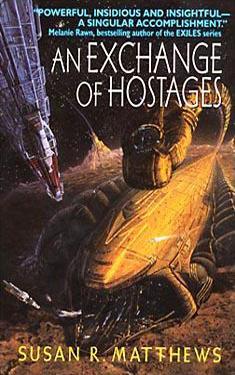Susan R. Matthews
Completed 5/13/2018, Reviewed 5/13/2018
2 stars
Only occasionally does a book come along which I just don’t
care to be reading. This was one of
them. I found the premise intriguing but
the execution was awful. I found it
difficult to read and the narration to be confusing. I ended up just barely absorbing what I
read. There were only a few aspects of
the book I liked, but that didn’t make up for how much I disliked it in
general.
 The premise as I said is intriguing. Andrej is a recent medical school graduate
who reluctantly agrees to become an inquisitor, i.e. a torturer and executioner. He goes to a space academy where he learns
the tricks of the trade in ten easy lessons.
Okay, I’m being facetious there.
It’s not easy, but there are ten levels of training. Upon graduation, he will be assigned as a
Chief Medical Officer aboard a space ship.
The result is that Andrej is one of the best torturers in years, though
he finds it simultaneously morally repugnant and sexually arousing. While at this training center, he makes a
vile enemy of another student, little to his knowledge. Mergau is a sadist in a non-sexual mode,
making up excuses for how she goes beyond the limits of levels she’s supposed
to be learning. She reviles Andrej. On the other hand, Andrej’s personal slave
while at torture school, Joslire, comes to love him in a way that he has not
experienced with any other master.
The premise as I said is intriguing. Andrej is a recent medical school graduate
who reluctantly agrees to become an inquisitor, i.e. a torturer and executioner. He goes to a space academy where he learns
the tricks of the trade in ten easy lessons.
Okay, I’m being facetious there.
It’s not easy, but there are ten levels of training. Upon graduation, he will be assigned as a
Chief Medical Officer aboard a space ship.
The result is that Andrej is one of the best torturers in years, though
he finds it simultaneously morally repugnant and sexually arousing. While at this training center, he makes a
vile enemy of another student, little to his knowledge. Mergau is a sadist in a non-sexual mode,
making up excuses for how she goes beyond the limits of levels she’s supposed
to be learning. She reviles Andrej. On the other hand, Andrej’s personal slave
while at torture school, Joslire, comes to love him in a way that he has not
experienced with any other master.
Of all the characters, I liked Joslire the best. He has the best characterization with an
actual arc of development. His growth from
being a personal slave to just another student to becoming confidante and
eventually friend. Unfortunately, the
main character Andrej, while an interesting character, doesn’t have much of a
growth arc. He mostly gets drunk to calm
the cognitive dissonance he experiences for both getting off on the torture and
feeling like a sinner for causing pain and death. Mergau, being the antagonist, is merely one
note. With this book being the first of
a hexology, I think her main purpose is introduction and motivation for being a
thorn in Andrej’s side in later books.
What I didn’t like about the book was the writing
style. I thought the prose seemed
forced, with word choices that were meant to impress rather than convey the
story. The dialogue was often broken up
by internal thoughts, making for rather disjointed conversations. And the point of view of the narration
changed a lot, going between these three main characters, another indentured
servant, and several academy higher ups.
I think the narration would have been a lot more effective if the author
stuck to maybe three points of view.
One thing I thought was really strange was the author refers
to Andrej’s penis as his fish. That was
just bizarre. There aren’t a lot of references
to, but when there are, it just made me laugh.
There wasn’t any other real humor in the book, and I don’t think this
was supposed to be funny.
I think the book is supposed to be taking the whole torture concept
to its natural conclusion if left unchecked. With all the public awareness of torture that
governments perform, this could be a timely book. A lot of other reviews I read would agree
with this statement. But I found it a
chore to read and didn’t have any sense of profound insight into the future of
the military-industrial complex while reading.
I was going to give this book one star, but reflecting on how much I
liked Joslire, I realized it had at least one redeeming quality for me. So I settled on two stars out of five.
No comments:
Post a Comment